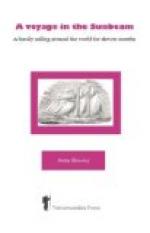As we gradually opened out our anchorage—Puerto Bueno—we found a steamer already lying there, which proved to be the ‘Dacia,’ telegraph ship, just in from the Pacific coast. Having dropped our anchor at about 5 p.m., we all went on shore, armed as before, some of the gentlemen hoping to find a stray duck or two, at a fresh-water lake, a little way inland. We met several of the officers of the ‘Dacia,’ who, being the first comers, did the honours of the place, and told us all they knew about it. The vegetation was as luxuriant and beautiful as usual—in fact, rather more so; for we are now advancing northwards at the rate of about a hundred miles a day. There were no ducks in the lake, but we enjoyed the scramble alongside it, to the point where it falls over some rocks into the sea. The gig was drawn under this waterfall, and having been loaded to her thwarts, with about three tons and a half of excellent water, she was then towed off to the yacht, where the water was emptied into our tanks, which were thus filled to the brim. A small iceberg, also towed alongside, afforded us a supply of ice; and we were thus cheaply provided with a portion of the requisite supplies for our voyage. The ‘Dacia’ had an iceberg half as big as herself lying alongside her, and all hands were at work until late at night, aided by the light of lanterns and torches, chopping the ice up and stowing it away.
Our boat being thus engaged, we were obliged to wait on shore until long past dark; but as we were a large and strong party, it did not much matter. Our men amused themselves by collecting a number of large and excellent mussels, some of which, distinguishable by the peculiar appearance of their shells, arising from a diseased condition of the fish, contained from ten to thirty very small seed pearls. The captain of the ‘Dacia’ came to dinner, and the officers in the evening; and they gave us much valuable information about the anchorages further up the Straits, and many other things. The captain kindly gave Tom all his Chilian charts of the Darien Channel, which has not yet been fully surveyed by the English Government, though the ‘Nassau’ passed through in 1869.
Wednesday, October 11th.—I never in my life saw anything so beautiful as the view when I came on deck this morning, at a quarter to five. The moon was shining, large and golden, high in the heavens; the rosy streaks of dawn were just tinging the virgin snow on the highest peaks with faint but ever-deepening colour; whilst all around, the foliage, rocks, and icebergs were still wrapped in the deepest shade. As the sun rose, the pink summits of the mountains changed to gold and yellow, and then to dazzling white, as the light crept down into the valleys, illuminating all the dark places, and bringing out the shades of olive-greens, greys, and purples, in the most wonderful contrasts and combinations of colour. The grandeur of the scene increased with every revolution




